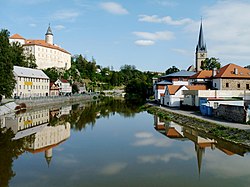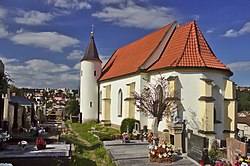Ledeč nad Sázavou
 From Wikipedia - Reading time: 9 min
From Wikipedia - Reading time: 9 min
Ledeč nad Sázavou | |
|---|---|
 View towards Ledeč nad Sázavou Castle | |
| Coordinates: 49°41′43″N 15°16′40″E / 49.69528°N 15.27778°E | |
| Country | |
| Region | Vysočina |
| District | Havlíčkův Brod |
| First mentioned | 1181 |
| Government | |
| • Mayor | Zdeněk Tůma |
| Area | |
• Total | 17.01 km2 (6.57 sq mi) |
| Elevation | 353 m (1,158 ft) |
| Population (2025-01-01)[1] | |
• Total | 4,749 |
| • Density | 280/km2 (720/sq mi) |
| Time zone | UTC+1 (CET) |
| • Summer (DST) | UTC+2 (CEST) |
| Postal code | 584 01 |
| Website | www |
Ledeč nad Sázavou (Czech pronunciation: [ˈlɛdɛtʃ ˈnat saːzavou]; until 1921 Ledeč) is a town in Havlíčkův Brod District in the Vysočina Region of the Czech Republic. It has about 4,700 inhabitants. The historic town centre is well preserved and is protected as an urban monument zone.
Administrative division
[edit]Ledeč nad Sázavou consists of five municipal parts (in brackets population according to the 2021 census):[2]
- Ledeč nad Sázavou (3,985)
- Habrek (201)
- Horní Ledeč (486)
- Obrvaň (91)
- Souboř (45)
Geography
[edit]Ledeč nad Sázavou is located about 23 kilometres (14 mi) northwest of Havlíčkův Brod and 39 km (24 mi) northwest of Jihlava. The southern part of the municipal territory with the town proper lies in the Křemešník Highlands and the northern part extends into the Upper Sázava Hills. The highest point is the hill Ostojovka at 540 m (1,770 ft) above sea level. The Sázava River flows through the town.
History
[edit]The first written mention of Ledeč is from 1181,[3] when it was written about a noble from Ledeč. In the first half of 16th century, during the rule of the Ledecký of Říčany noble family, Ledeč was promoted to a town.[4]
In the early 19th century, the railway was built, which helped the economical and cultural development of the area.[4]
Until 1918, the town was a part of Austria-Hungary, in the district of the same name.[5] In 1921, Ledeč was renamed Ledeč nad Sázavou.[4]
Demographics
[edit]
|
|
| ||||||||||||||||||||||||||||||||||||||||||||||||||||||
| Source: Censuses[6][7] | ||||||||||||||||||||||||||||||||||||||||||||||||||||||||
Transport
[edit]Ledeč nad Sázavou is the terminus and starting point of the railway lines from/to Havlíčkův Brod and Čerčany.[8]
Sights
[edit]
The main sight is the Ledeč nad Sázavou Castle. The castle was built in the early Gothic style in the first half of the 13th century, and later was rebuilt in Renaissance and Baroque styles. It has a unique sgraffito decoration of the ceiling of the Renaissance hall. The castle now contains a museum and a gallery. It has a 32-metre (105 ft) high tower open to the public.[9]
Among the main landmarks of the town centre is the Church of Saints Peter and Paul. It is a large Gothic building. A unique element is the rib vault, which is not load-bearing and has purely decorative purpose.[10] The Church of the Holy Trinity is a Renaissance cemetery church. It dates from 1585.[11]
Notable people
[edit]- Zdeněk Bárta (1891–1987), fencer
- František Laudát (born 1960), politician
- Jiří Havlíček (born 1976), politician
References
[edit]- ^ "Population of Municipalities – 1 January 2025". Czech Statistical Office. 2025-05-16.
- ^ "Public Census 2021 – basic data". Public Database (in Czech). Czech Statistical Office. 2022.
- ^ "Ledeč nad Sázavou". Vysočina Region. Retrieved 2024-03-22.
- ^ a b c "O městě". Město Ledeč nad Sázavou. Retrieved 2021-10-29.
- ^ Die postalischen Abstempelungen auf den österreichischen Postwertzeichen-Ausgaben 1867, 1883 und 1890, Wilhelm Klein, 1967.
- ^ "Historický lexikon obcí České republiky 1869–2011" (in Czech). Czech Statistical Office. 2015-12-21.
- ^ "Population Census 2021: Population by sex". Public Database. Czech Statistical Office. 2021-03-27.
- ^ "Detail stanice Ledeč n.Sázavou" (in Czech). České dráhy. Retrieved 2024-03-22.
- ^ "Hrad Ledeč nad Sázavou". Město Ledeč nad Sázavou. Retrieved 2021-10-29.
- ^ "Kostel sv. Petra a Pavla" (in Czech). National Heritage Institute. Retrieved 2024-06-04.
- ^ "Kostel Nejsvětější Trojice" (in Czech). National Heritage Institute. Retrieved 2024-06-04.
External links
[edit]
 KSF
KSF

